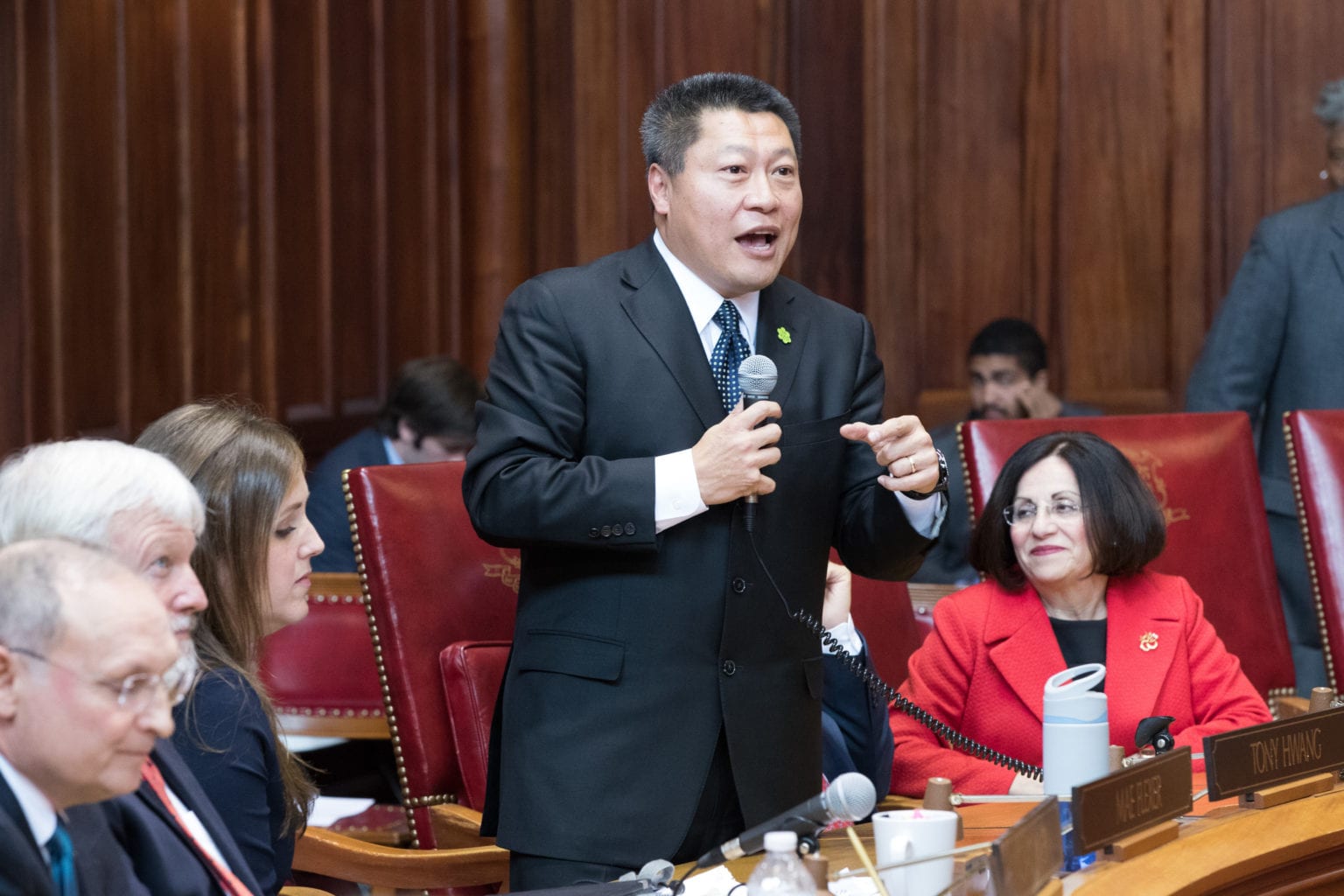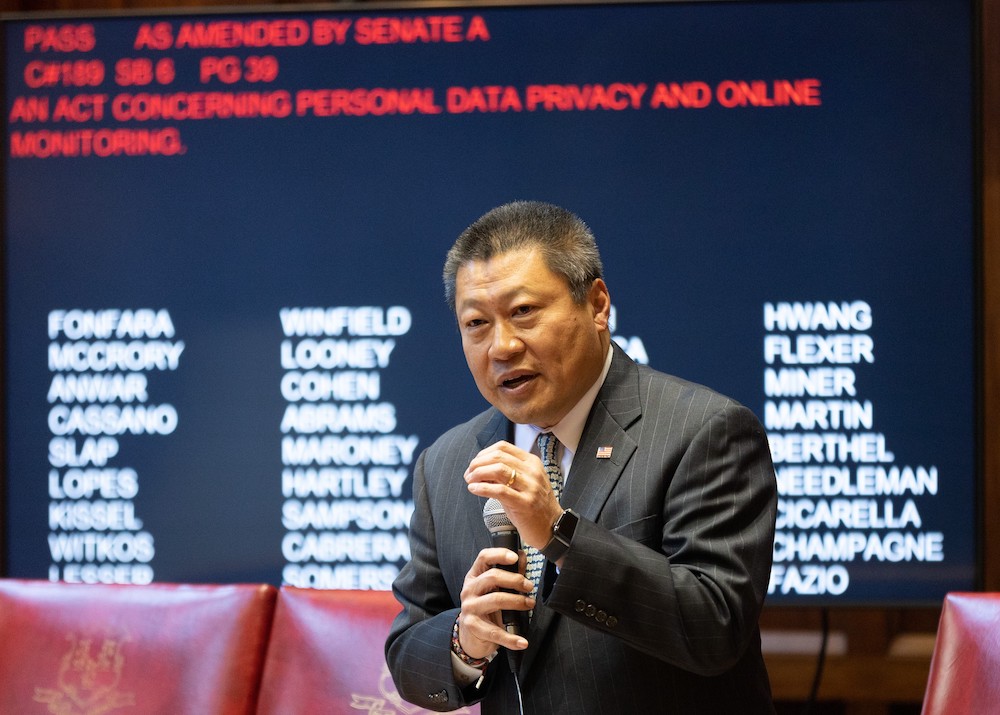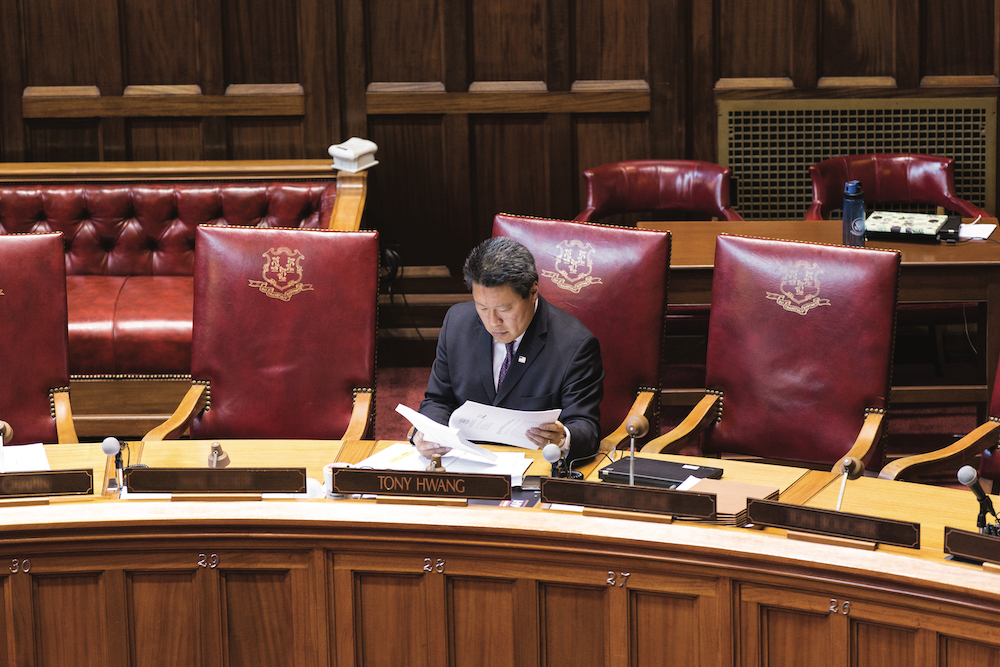As Connecticut’s 2016-17 fiscal year closed with lawmakers failing to agree on a state budget, and following strong statements issued by their fellow Newtown delegation members, Representative J.P. Sredzinski (R-112) and Senator Tony Hwang (R-28) both reached out to The Newtown Bee with statements about the debacle that has dragged on at the state capital for weeks, and is now prompting a special budget session.
“This, in my view, is a dereliction of duty. This is failure,” stated Sen Hwang. “We’re ready to vote on a budget. We’re here at the State Capitol on behalf of state taxpayers. We’re here to work.”
With time running out on the legislature’s regular session and the end of the fiscal year looming, Rep Sredzinski said he stood with colleagues in the House Republican caucus in calling for an up-or-down vote on a GOP proposed balanced, no-tax increase state budget.
“I can’t stress enough how unprecedented this is — it’s the first time in recent history there will not be a state budget because the legislature failed to pass one,” Rep Sredzinski said. “Democratic leadership failed to even produce one out of committee and refused to call the budget proposed by House Republicans for a vote. It has to be a priority for all legislators to convene immediately to debate and pass a budget. Connecticut’s families, businesses, and our towns and cities deserve and expect us to at least vote on one.”
According to a release issued by the Monroe lawmaker, whose district also overlays several neighborhoods in southern Newtown, Legislative Republicans proposed a complete balanced budget this spring and then revised that proposal to account for a dramatic drop in revenue receipts. He said even though majority Democratic leaders did not produce a plan before or since the legislative committees reached their deadlines during the regular session, they will not agree to call the Republican budget for a vote.
Since no budget was passed by the end of the fiscal year on June 30, the governor is running the state by executive order. Rep Sredzinski warned that a prolonged budget struggle will cause substantial problems for towns and cities that count on state revenue to help run local government.
Residents most at risk and in need of social services will also be significantly affected, he said.
The Connecticut Mirror reported that Governor Dannel Malloy met with reporters in his Capitol office on June 30, and echoed the warning that social services, aid to towns, and most other programs would suffer significantly without a new budget.
“This is a regrettable path and one that I worked very hard to avoid,” Gov Malloy said, referring to the three-month provisional budget he asked legislators to adopt. But at the same time, the governor urged all legislators to focus on getting him an approved spending plan.
“I do not doubt that we can and will get through this,” the governor said. “Connecticut’s elected leaders will come together, and we will adopt a full, biennial budget. My administration will continue working every day towards that end — towards a budget that makes the necessary structural changes to achieve balance, now and into the future.”
Massive Deficit Forecast
The Connecticut Mirror reports that House Democratic leaders have said they are calling rank-and-file members back to the Capitol on July 18, possibly to vote on a two-year budget — if one has been negotiated — or on a provisional one. But legislators have been gridlocked for months over how to close huge projected deficits.
State finances, unless adjusted, are projected to run $2.3 billion in deficit in 2017-18, a shortfall of 12 percent. The potential gap rises to $2.8 billion or 14 percent in 2018-19. Lawmakers have said they hope to avoid major tax hikes after ordering them in 2011 and 2015, but taxes remain a point of contention, as do proposed cuts to social services and municipal aid, as well as a tentative concessions deal between the governor and state employee union leaders.
The process appears to be most vexing for Sen Hwang.
“Connecticut Senate Republicans have produced a detailed, line-by-line, thoughtful budget that has been thoroughly vetted by nonpartisan analysts,” he said.
The Senate Republican plan, which can be read at ctsenaterepublicans.com:
*Restores cuts to town aid
*Restores cuts to local education funding
*Restores cuts to hospitals
*Does not harm nonprofit organizations
*Reduces the size of government
*Makes necessary changes to state employee benefits
*Protects core services for seniors, the disabled, children, and our most at-risk residents
“Unfortunately, the Senate Republican plan never received a vote prior to the end of the fiscal year,” Sen Hwang said. “The Democrat Speaker of the House, who controls the House legislative agenda, refused to allow votes on any budget proposals.”
What happens now?
“The governor has unveiled an executive order which will ‘impose drastic spending cuts to local funding, hospitals and social services.’ Vulnerable people will be hurt. Pain will be inflicted. This didn’t have to happen,” Sen Hwang said. “[Newtown] taxpayers sent me to Hartford to work on your behalf and to be your advocate. On June 29, I showed up at the State Capitol to do exactly that. We were blocked from doing so, and that’s truly a shame.”
Sen Hwang and Rep Sredzinski both urge taxpayers to call state legislators, tell them how you feel, and tell them to do their job.
“The risk posed to town aid, education funding, hospitals, and other core services, as well as the people who rely on them, really cannot be overstated should no budget be adopted and the governor be allowed to run the state by executive order,” Rep Sredzinski said. “We have been warned, yet Democratic leadership is choosing not to act. I am disgusted that Democrats view this as acceptable for Connecticut.”
Rep Sredzinski also noted that House Republicans stepped up to the plate and developed a complete budget package that was updated twice to reflect declining revenue.
“If the Democrats don’t want to lead, the people in Connecticut need to know that Republicans are,” he added. “Passing our budget is the best possible option…and I urge my friends on the other side of the aisle to consider this proposal for the good of the people of this state.”
When the new fiscal year began Saturday, Connecticut was figuratively holding payment due notices for hundreds of millions of dollars more for things like payments on bonded debt; contributions to pensions and retiree heath care programs; Medicaid services bound by federal entitlement rules; and court-ordered child welfare services.
None of these extra costs goes down by one penny just because there is no new budget, The Connecticut Mirror reports. Further compounding matters, eroding income tax receipts and other General Fund revenues are expected to drop $400 million in the new fiscal year compared with the outgoing one — and revenues in the outgoing year already came in $400 million below expectations.
















